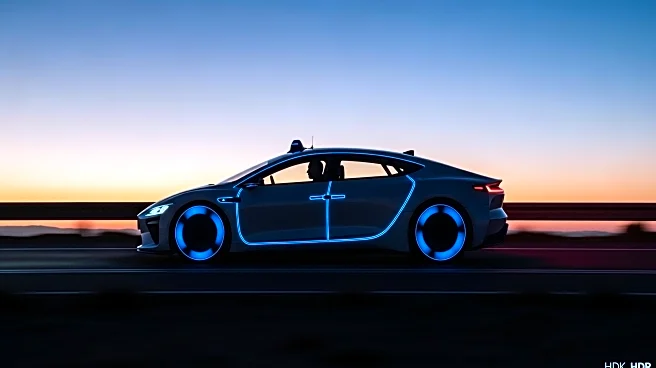What's Happening?
The National Highway Traffic Safety Administration (NHTSA) has initiated a federal safety probe into Tesla Inc.'s Full Self-Driving (FSD) software. This investigation follows reports of 58 incidents where Tesla vehicles allegedly violated traffic laws, including driving through red lights and traveling in the wrong direction. The probe covers approximately 2.9 million vehicles equipped with the FSD system. Tesla has not yet commented on the investigation. The scrutiny of Tesla's driver-assistance technology is expanding, with previous investigations into other features such as Autopilot and crash reporting. The FSD system is a key component of CEO Elon Musk's vision for driverless cars, although drivers are required to supervise its use. The NHTSA's investigation aims to assess the scope, frequency, and safety implications of the reported incidents.
Why It's Important?
This investigation is significant as it highlights ongoing concerns about the safety and reliability of Tesla's driver-assistance technology. The outcome could impact Tesla's reputation and its ability to market FSD as a step towards fully autonomous vehicles. If the NHTSA finds substantial safety risks, Tesla may face regulatory actions, which could lead to costly recalls or software updates. The probe also underscores the broader challenges in developing and deploying autonomous driving technologies, which have implications for public safety and regulatory standards. Stakeholders such as consumers, investors, and competitors are closely watching the developments, as they could influence the future of autonomous vehicle technology and its integration into everyday transportation.
What's Next?
The NHTSA will continue to gather data and analyze the incidents involving Tesla's FSD system. Depending on the findings, the agency may require Tesla to implement changes to improve safety or face penalties. Tesla's response to the investigation, including any potential software updates or safety measures, will be crucial in addressing regulatory concerns. The automotive industry and regulatory bodies are likely to monitor the situation closely, as it may set precedents for how driver-assistance technologies are evaluated and regulated. The investigation could also prompt discussions on the ethical and legal responsibilities of automakers in ensuring the safety of semi-autonomous systems.
Beyond the Headlines
The investigation into Tesla's FSD system raises broader questions about the ethical and legal implications of autonomous driving technologies. As these systems become more prevalent, there is a growing need to establish clear guidelines and standards for their safe operation. The probe may influence future regulatory frameworks and industry practices, potentially leading to stricter oversight and accountability measures for automakers. Additionally, the investigation highlights the importance of transparency and timely reporting of incidents by companies developing advanced driver-assistance systems.









